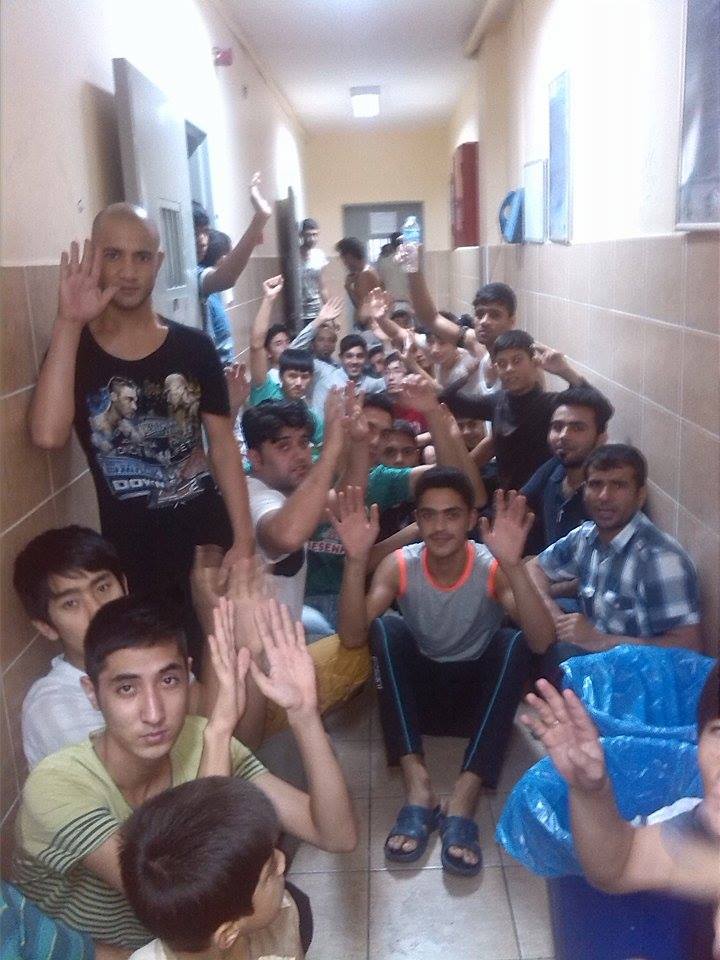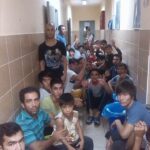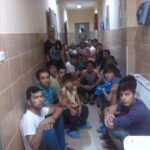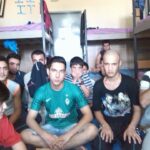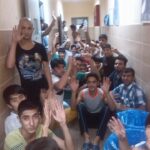Suffering News: 150 Afghan Refugees (children, women & men) in Yabaneilar Sube Izmir, Turkey who are locked up, due to harsh condition and force deportation, stop eating food till their rights are accepted.
Tag: Afghan refugees
-
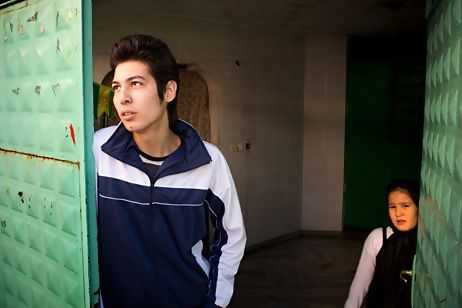
Afghan refugees leave Iran for Turkey
ISTANBUL // A dark and damp basement of an Istanbul mosque is home to about 30 people who have nowhere else to go, victims of a new and largely unnoticed refugee crisis in Turkey.

Most of the inhabitants of the basement, which used to serve as the mosque’s morgue, are Afghan refugees. They are new arrivals, not from Afghanistan directly, but from Turkey’s eastern neighbour Iran, where conditions for refugees have started to worsen.
There are about 20,000 Afghan refugees in Turkey, most of whom have arrived in recent months, according to the Ankara office of UNHCR, the UN refugee agency.
At the mosque in the neighbourhood of Zeytinburnu, just outside the ancient city walls, a local charity has been providing shelter, food and clothes for the Afghans and several Iranians, who have also moved into the basement.
“What else can we do,” Kiyaz Aras, the deputy chairman of the charity that runs the mosque, said this week. “They would be out on the street otherwise.”
One of the refugees, Sajjad Ramizani, 18, son of a family of Afghan refugees in Iran, said his parents decided to send him to Turkey with his grandmother and an uncle half a year ago.
He and other refugees say there is increasing pressure on Afghans in Iran to leave, as Tehran is facing growing economic difficulties, caused in part by western sanctions in response to Iran’s nuclear programme.
Mr Ramizani’s parents remain in Iran. “But they want to come as soon as they have the money,” he said.
In the past two years, efforts to help refugees in Turkey have focused on the region bordering Syria, where close to 180,000 Syrians are sheltered in government-run camps. But in the shadow of the Syrian crisis, the number of Afghan refugees in Turkey has started to rise dramatically.
Only 7,000 Afghans are officially registered, the UN agency said in a written response to questions this week. “As a result of a sharp increase from June 2012 onwards an additional 13,000 have approached UNHCR.”
Most of the Afghans arriving here come not straight from their homeland, but from Iran, home to around 820,000 Afghan refugees.
The UNHCR said the increase was “due to many factors, including the fear of Afghans for what will happen in Afghanistan after the international troops pull out in 2014 and the economic situation in Iran which makes it very difficult for many Afghans in Iran to be able to survive”.
Abdulriza Sagagi, a spokesman for the Iranian embassy in Ankara, denied that his country was pushing the Afghans out.
“There is no pressure whatsoever,” Mr Sagagi said by telephone. He suggested that such complaints came from Afghans who wanted to improve their chances of being accepted by a western country.
But refugees, such as Mr Ramizani, said the pressure was real.
Born into a family of Afghan refugees in the Iranian city of Isfahan, Mr Ramizani said his family was suddenly confronted with a hostile attitude by Iranian authorities last year.
“We had a shop there, and we had a car,” Mr Ramizani said. “Then the police came and closed down our shop and took away our car.”
Mr Ramizani now works as a helper at a car park in Istanbul and tries to keep in touch with his parents by calling them from one of the phone shops in Zeytinburnu that advertise cheap telephone calls to Afghanistan, Iran and central Asian countries.
Up the road from the mosque, Aci Nusrat, another newly-arrived Afghan refugee, was taking a walk in the warm February sun.
Mr Nusrat, 60, fled Afghanistan shortly after the Soviet invasion of 1979 and settled in the Iranian city of Shiraz, where he worked as a teacher in a karate school. Then, about two months ago, the life he had known for 30 years came to an abrupt end.
“All of a sudden, they refused to give new papers to Afghans,” he said about Iranian authorities. Mr Nusrat and his family of seven decided to go to Turkey, which they reached after a trek over the mountains. After arriving in Zeytinburnu, his son found work at a construction company so the family can afford its own apartment.
Since coming to Istanbul, Mr Nusrat, whose crushing handshake betrayed the lifelong athlete, has been trying to keep fit by working out on gym machines in a public park on the shore of the nearby Sea of Marmara. Although he entered Turkey illegally and lacks valid identity papers, he said he was not concerned about being extradited from Turkey.
“The police here are good, they are bad in Iran,” he said. “I want to stay here.”
Turkey does not grant refugee status to Afghans, but agrees to let them stay in the country while UNHCR officials try to find countries willing to take them in, a process that can take years.
Taner Kilic, director of the Association for Solidarity with Refugees (Multeci-Der), an NGO, said Afghan refugees in Turkey had to wait up to four years before getting their first interview at the UNHCR to talk about a possible move to another country.
via Afghan refugees leave Iran for Turkey – The National.
-
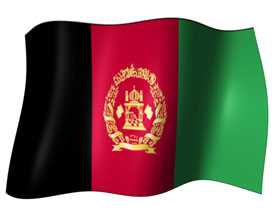
Afghan refugees homeless after Turkey quake
AFP
Sat Oct 29 2011 12:25:52 GMT+0400 (Arabian Standard Time) Oman Time
 Afghan: Afghan refugee Nergis Shovar washes dishes in muddy water in front of the tent that’s been home since a devastating 7.2 magnitude earthquake struck eastern Turkey last week.
Afghan: Afghan refugee Nergis Shovar washes dishes in muddy water in front of the tent that’s been home since a devastating 7.2 magnitude earthquake struck eastern Turkey last week.“My house collapsed during the quake… I fled the house. Now I am living here with my family,” she said, speaking through a translator, adding that 13 people were living in the tent.
The 18-year-old is just one of around 2,000 refugees in the quake-hit Van province, mostly Afghans, many of whom have seen their homes damaged or destroyed in the October 23 quake.
Afghan Foziye Muhammedi, 17, said she too was sheltering in a tent along with her sisters and mother in the canvas village set up for victims in Van city.
“No father, no brother… only three sisters and mother,” she said, struggling to articulate her misery.
“Turkey is a beautiful country,” she said. “It is more beautiful than Afghanistan. But now after the quake, it is so hard to live here.”
Avogul Kurbaneli, an Afghan woman, who appeared to be in her sixties, pointed to a makeshift shelter she had constructed from nylon.
“We are four people… I have nothing to eat. I don’t have a tent,” she said.
“We want a tent,” said added. “We want bread.”
Van province, bordering Iran, is one of 52 locations nationwide where refugees are temporarily accommodated before being resettled in third countries.
Sunday’s quake killed 570 people and injured 2,500, according to official figures.
The nightly sub-zero temperatures have ensured even more misery for survivors who have been forced to camp out amid fears that even those buildings still standing could collapse in aftershocks.
“We have received no reports of deaths or injuries among the refugee population in Van province,” said Metin Corabatir, spokesman for the United Nations High Commissioner for Refugees’ (UNHCR) Turkey office.
“But most of their houses were damaged during the quake and they cannot go back out of fear,” he added.
“I came to Turkey two years ago,” said Metini Emini, 24, speaking in Turkish.
“I don’t want to go back to Afghanistan where the Taliban looted our house in Kabul,” he added. “The war is still continuing there.”
Emini said he was working at a tailor’s shop in Van city earning a daily wage of 15 liras (seven euros).
“Only me and my brother work in our family of seven people. I was paying 180 liras (90 euros) a month for my house which collapsed during the quake. It is very hard to survive now.”
Emini is now living in a tent he put up in the garden of the collapsed house.
The UNHCR is working with the Turkish government to relocate refugees who wish to move to another city.
“We are thinking about relocating volunteer refugees to other satellite cities in Turkey. Those who don’t want to leave are free to stay in Van,” said Corabatir.
(Follow timesofoman.com on Facebook and on Twitter for updates that you can share with your friends.)
via Times of Oman.
-
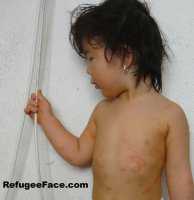
An open letter from Afghan refugees in Turkey to UNHCR
Dear UNHCR Authorities,
 Afghans refugees are the third largest irregular refugee group in Turkey. Most have fled the war in Afghanistan. In 2010, refugees from Afghanistan numbered near 3,500 and made a sizable proportion of Turkey’s registered migrants. Most of them were spread out over satellite cities, with the following being the specific locations: Van, Ağrı, Kayseri, Gaziantep, Eskişehir, Çorum, Adana, Kahraman Maraş, Newşehir, Niğde, Sivas, Tokat, Istanbul, Ankara, Kutahya, Burdur, Konya, Karaman, Aksaray, Niğde and Hatay.
Afghans refugees are the third largest irregular refugee group in Turkey. Most have fled the war in Afghanistan. In 2010, refugees from Afghanistan numbered near 3,500 and made a sizable proportion of Turkey’s registered migrants. Most of them were spread out over satellite cities, with the following being the specific locations: Van, Ağrı, Kayseri, Gaziantep, Eskişehir, Çorum, Adana, Kahraman Maraş, Newşehir, Niğde, Sivas, Tokat, Istanbul, Ankara, Kutahya, Burdur, Konya, Karaman, Aksaray, Niğde and Hatay.Over the years, the number of Afghans entering Turkey has greatly increased. As of January 2010, Afghans consisted one-sixth of the 26,000 remaining refugees and asylum seekers in Turkey. By the end 2011, with the increase of war and violence in Afghanistan, their numbers are expected to surge up to 10,000, making them the largest refugee group, surpassing all other groups.
Afghan refugees are victims of the Afghan government’s propaganda, which makes the UNHCR think that Afghanistan has become safe and its refugees need little assistance. This mindset from your organization toward Afghan refugees confirms what people say about the UNHCR – that it is an institution that doesn’t truly respect human rights. Because of this approach by the UNHCR, a large number of Afghan refugees have lost their lives as they have chosen to independently and illegalty smuggle themselves to EU member countries.
When it comes to Afghan refugees in Turkey, we believe that UNHCR chooses not to uphold the rights of these refugees, and refuses to comply with its own mandate. Refugee applications take far too long to process, and living conditions for refugees are untenable.
Day after day, week after week, month after month, and year after year, we live with lies and broken promises of change, and when change comes, it is for the worse and not for the better. Nothing improves despite all the negotiations.
Like you, we were fed the love of my country. Like you, we remember our past and present, and remember the rusty keys of my parents’ home, keys to doors that exist no more, but keys that have their doors in our hearts and our imaginations. These rusty keys are still with us. We remember that we were brought up with this eternal belief that right is right, and nothing can justify ignoring it.
But for our children, the situation is very bad. They feel excluded and discriminated against. They are ashamed because they live in refugee housing and therefore they do not bring their friends from school to their apartments. The children have no room and space for themselves. They have little possibilities to learn from school. They ask their parents for help with their school lessons, but their parents don’t know the new language. The futures of our children are being destroyed in the collective refugee buildings. They become adults earlier than other children, because they live among other refugees, most of whom are adults, under harsh conditions. Through the control of the janitors and their presence, they feel in their young life like they are in prison.
It is hard to imagine that in this century, families spend their nights hungry, and children spend their nights playing in the dim light of a candle because their families can’t afford to pay for electricity. It is even worse to imagine that in the peak of the world modernization, some groups of people are locked in a small place and denied the freedom of movement. It is hard to imagine that a mother gives birth to two babies here, and the firstborn child is going to be five, having waited all her life for a change in her status file that is yet to come. It is hard to imagine that the Afghan refugees live here without the right to work, and only getting some money for paying for food and rent.
We believe in human values and human rights and generosity. We believe in freedom, justice, peace, democracy and equality. We believe that people who fight for justice and against oppression are heroes, like you. We believe that you are a role model, and you will affect generations to come.
But we are also the witness of UNHCR staff sometimes working to the detriment of Afghan refugees. During the last night of 2010, many fıles of Afghan refugees learned that they had been accepted, and they ware happy with UNHCR for this kind of pleasant surprise. Unfortunatly, after two days, our smiles vanished as we learned that our files had been changed to Private Accept (Özel kabul in Turkish). This incident shows the quality of work the UNHCR staff in Ankara performs for Afghan refugees.
We are the witness of a letter sent it the same document to an Afghan refugee twice after three months. This also shows the quality of work your staff in Ankara performs for Afghan reffugees.
We do not accept such inattention and violations of the rights of Afghan refugees, and we, jointly with Afghan refugees all over of Turkey, therefore make the following demands:
• Until our primary demand is implemented, we ask that UNHCR take immediate steps to ensure that the status determination procedures are efficient, fair, and transparent, and that UNHCR and its affiliated organizations are accountable to asylum-seekers
• UNHCR must explain why the cases of Afghan refugees in Turkey take significantly longer to process compared to those of other refugees
• UNHCR must explain why the case of many Afghan refugees, which have been accepted already by UNHCR, are suspended within 1 to 2 years
• UNHCR must explain why the cases of many Afghan refugees are in the Specific Acceptance status or in Turkish (Özel Kabul). We demand to know why the UNHCR refuses to explain this to us. And, finally, what is the difference between the Normal Acceptance and Specific Acceptance? How many years must those in the Specific Acceptance status wait for the change? We are demanding that the UNHCR change Specific Acceptance to Normal Acceptance.
• If you want to work for Afghan refugees, you must employ Afghan translators who are familiar with the Afghan language and culture. Because there is a big difference between Farsi – which the translators speak – and Dari – which the Afghan refugees speak – we don’t understand the translators well, and they in turn cannot understand us and fail to accurately convey what we mean. Translators must be proficient in Dari and must understand Afghan culture to ensure that refugees’ accounts are recorded correctly and in full.
• Interviews must be made comfortable; asylum-seekers should not feel criminalized by interviewers.
• Full and clear reasons for rejection must be disclosed in a detailed format, directly to the refugee, immediately after a decision has been made.
• We demand that all rejected case files immediately be reopened and reviewed under the standards for UNHCR’s operation demanded here.
• UNHCR must ensure that collaborating agencies and NGOs mandated to assist asylum seekers and refugees, for example ASAM, are free from corrupt practices and treat refugees fairly and in accordance with their rights.
The current situation of Afghan refugees in Turkey, which has been ongoing for years, is not now nor has it ever been acceptable. Our Coordination Group will continue to campaign until human rights violations cease and our refugees are protected by the UNHCR according to its mandate.
The UNHCR is well aware that many Afghan refugees who have been registered with the UNHCR choose to go to the EU illegally. They wait for a long period of time hoping a change in their status, but that does not happen. You are also well aware that many Afghan refugee families from several cities left Turkey to enter the EU illegally because UNHCR invented a new law by creating the “specific acceptance situation,” or in Turkish, Özel kabul.
We are asking you: “What have you done to process our status?” This is why we continue to work to make a positive change and work for a better tomorrow at a time when every day that comes is worse than the day before for us.
We, the Afghan refugees, have been patient for a very long time, waiting for a change in our files. We have been silent since the UNHCR office inaugurated in Turkey and relied solely on you and your staff, but unfortunately, in the last few years, nothing has changed for us, instigating us to start the protest.
We don’t know if you will read these words or not, but we do hope that such words that come from our heart will reach yours, and you can find the hope and strength our people still have in them. Right is right, and justice is justice. All people are equal, and no race or color is superior above the others.
We urge you all to do something to save our kids and their future, and treat us as human beings who have the right to have a decent life.
We expect the UNHCR to immediately take measures to address these demands. The process of granting prima facie status to Afghan refugees must be fast-tracked. Anything less is unacceptable and will be met with continued public protests and action, including legal action, against the UNHCR.
We fear the day when our refugees, despondent about their prospects here, decide to go to the EU en masse. Thus, it is a need that your office takes urgent measures to solve these problems. We think it is time that your office rightly addresses this issue before it is too late. Otherwise, we will ask the international community to help Afghan refugees to change the political line of the UNHCR.
We will ask workers of the UN, the UNHCR and other workers of different institutions in different countries to show their support to Afghan refugees.
We hope to see some positive changes about the problems and concerns we have raised here. Thank you in advance for considering this open letter in a positive way; otherwise, we will be compelled to send it all of human rights organizations and the UNHCR headquarters.
In conclusion, we thank you for taking the time to hear our views and beliefs. We are eagerly awaiting your response, and hope dearly that no legal action will need to be taken.
Sincerely,
Coordination Group of Afghan Refugees in Turkey
Turkey

